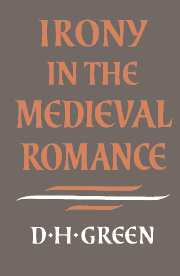Book contents
- Frontmatter
- Contents
- Preface
- Abbreviations
- 1 Introduction
- 2 The possibilities of irony in courtly literature
- 3 Irony and chivalry
- 4 Irony and love
- 5 Irony and narrative technique
- 6 Verbal irony
- 7 Irony of the narrator
- 8 Dramatic irony
- 9 The irony of values
- 10 Structural irony
- 11 The reasons for irony in the medieval romance
- Bibliography
- Index of passages discussed
- General index
4 - Irony and love
Published online by Cambridge University Press: 21 August 2009
- Frontmatter
- Contents
- Preface
- Abbreviations
- 1 Introduction
- 2 The possibilities of irony in courtly literature
- 3 Irony and chivalry
- 4 Irony and love
- 5 Irony and narrative technique
- 6 Verbal irony
- 7 Irony of the narrator
- 8 Dramatic irony
- 9 The irony of values
- 10 Structural irony
- 11 The reasons for irony in the medieval romance
- Bibliography
- Index of passages discussed
- General index
Summary
In turning to the second secular concern of courtly literature we may start by asking the same question as in the case of chivalry. Have we any right to expect an ironic view, with its reservations and even criticism, of a value which, as countless medieval poets remind us, was regarded as the inspiration of all virtues? The theory that love was omnium bonorum radix et causa principalis can therefore be proposed by Andreas Capellanus, whilst individual poets concentrate on its effects on men, as with the view of Bernart de Ventadorn that it is love and its service which make a man excellent (Per re non es om tan prezans/com per amor e per domnei), an opinion voiced by poets as different as P. de Capdeuil (Qu'amors es caps de trastotz bes,/E per amor es hom guays e cortes,/Francs e gentils, humils et orgulhos), Reinmar (MF 157,31: Und wiste ich niht daz si mich mac/vor al der welte wert gemachen, obe si wil,/ich gediende ir niemer mêre tac) and Gottfried (187: liebe ist ein also sælic dinc,/ein also sæleclich gerinc,/daz nieman ane ir lere/noch tugende hatnoch ere). These are categorical statements apparently excluding any suggestion of doubt or hesitancy. To argue an undercutting of an ideal of love praised in such superlatives suggests the willful malice of a Keii, the desire to see shortcomings where others have registered only virtues.
- Type
- Chapter
- Information
- Irony in the Medieval Romance , pp. 91 - 131Publisher: Cambridge University PressPrint publication year: 1979



